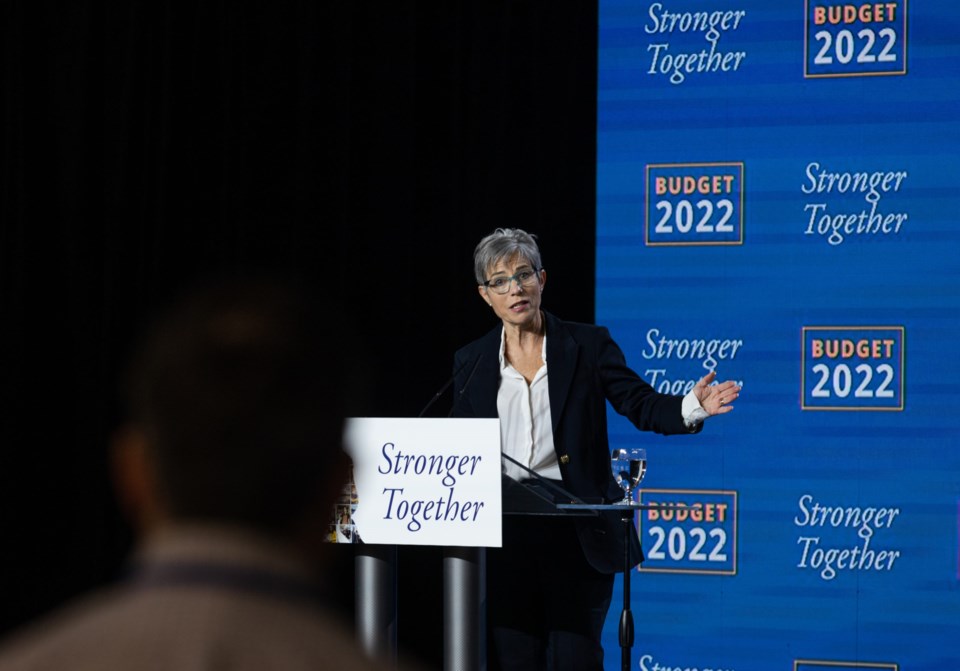One of the more interesting questions facing British Columbians right now is: Do you care if the provincial government is in deficit?
Probably not, if you are one of the those unable to afford to buy a home due to rising prices, or struggling to afford childcare, or looking for a raise as a burnt-out healthcare worker, or pulling double shifts due to a staffing shortage at a seniors’ home, or adjusting your grocery habits because of the rising price of meat, dairy and vegetables.
In short, no. Nobody cares about the BC government’s deficit right now, outside of a few fiscal hawks in the business community and credit-rating agencies in Toronto that have nothing better to do than reduce people to numbers.
BC’s New Democrat government knows this too. Which is why Tuesday’s provincial budget could have easily been balanced. But it wasn’t. Because it doesn’t have to be.
What’s the point of curtailing ministry spending across the board and fighting more than 300,000 unionized teachers, nurses, doctors, social workers and civil servants with lowball contract offers this year when nobody is going to appreciate the fiscal restraint shown with taxpayer funds to squeak out a miniscule surplus?
Instead, BC is on track to run a $5.5 billion deficit in 2022/23. That’s despite a provincial economy expected to grow 4 per cent over the next year, an unemployment rate fully recovered to pre-pandemic levels, and a current 2021/22 fiscal year in which revenues did so well that a $9.7 billion deficit shrunk to a paltry $483 million estimated Tuesday.
The money is being used partly to prop up the health care system after COVID-19, reduce surgical wait times, fight climate change, increase complex care homeless supports, create a new Declaration Act Secretariat to implement UNDRIP, fund a new Ministry of Land, Water and Resource Stewardship, and rebuild after last year’s historic flooding and wildfire damage.
All worthy endeavours, perhaps.
But none touch on the core affordability issue facing voters today, who are buffeted by rising prices, rising inflation, and soon-to-be rising interest rates.
On that, the BC NDP offered a promise to reduce child care fees by 50 per cent this year to hit an average $20 a day child care cost by the end of 2022.
It’s not quite the $10-a-day promised by the party in the 2017 election campaign (that won’t come until 2026, nine years after the party was elected), and it’s built almost entirely on the backs of billions gifted from Ottawa during its recent snap election campaign – but it’s still going to be highly welcome by parents across the province.
Yet on the equally important issue of housing affordability, the budget was largely silent.
It projects a 22.2 per cent decline in housing sales this year, not due to anything the province is doing but entirely caused by rising interest rates. It also predicts price hikes to cool to only a 3.4 per cent increase this year, a somewhat laughable estimate when they increased in Greater Victoria more than 20 per cent in January compared to the previous year.
The housing file in particular presents a conundrum for the government. It could offer cash to municipalities to incentivize faster permitting of new housing projects. And it would be smart to do so when cash is in abundant supply, due to deficit spending room. Instead, it appears to have both hands off the wheel and hoping the housing problem sorts itself out, while sticking to its four-year-old goal of 114,000 affordable housing units over 10 years, when it’s not even clear that will make a dent in the problem.
The budget also offered nothing to help renters again – a key constituency of voter the BC NDP prided itself upon courting in the 2017 and 2020 election campaigns.
All of which makes the 2022/23 budget even more perplexing. Why plunge the books into the red, at a time when voters support such a move, if you don’t intend on tackling some of the biggest financial pressures facing the wallets of ordinary British Columbians?
Why not take advantage of the moment to think big, and act big to help renters, homeowners, and anyone else struggling to pay rising bills for gasoline and groceries?
There appears to be a vast public appetite to allow the province the fiscal room if it’s willing to take on those issues. But Tuesday’s budget didn’t get there. It spent big, but fell short on big ideas.
Rob Shaw has spent more than 13 years covering BC politics, now reporting for CHEK News and writing for The Orca. He is the co-author of the national best-selling book A Matter of Confidence, and a regular guest on CBC Radio.



